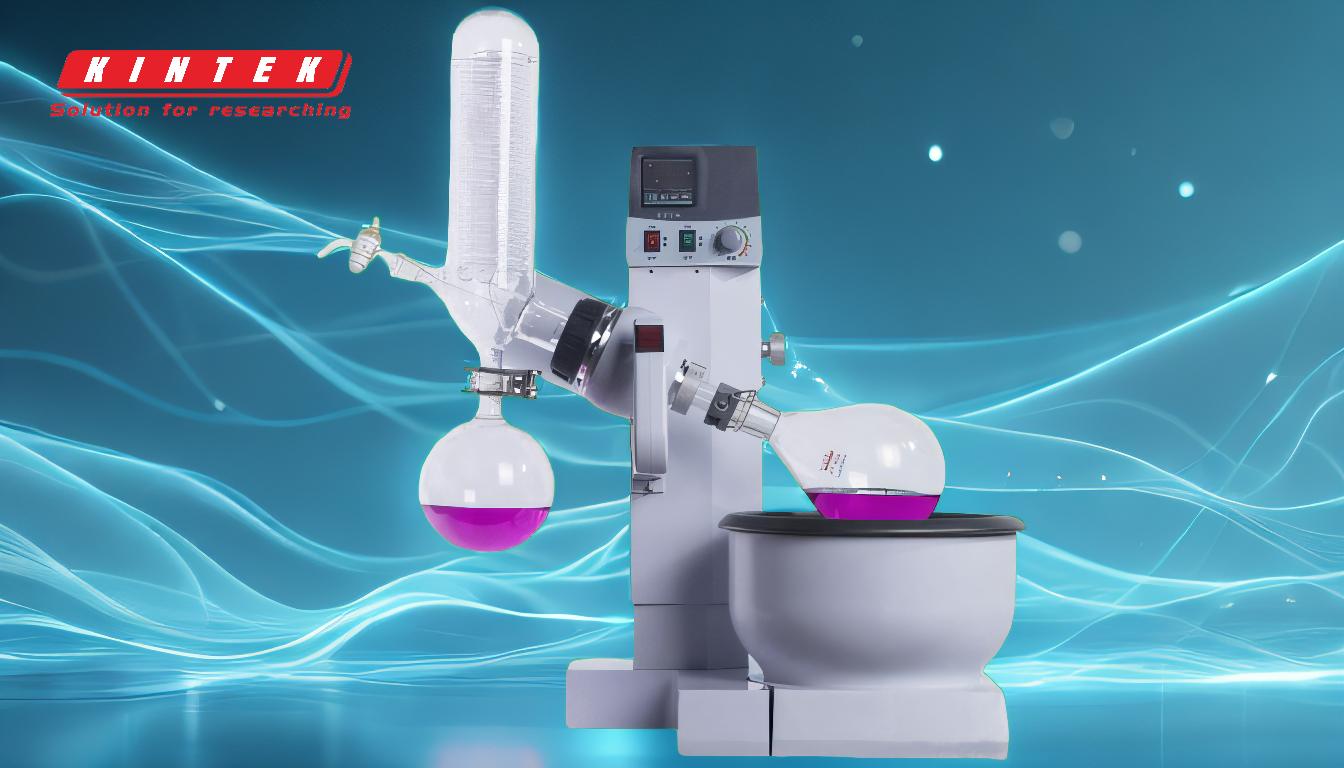A rotary evaporator, often referred to as a rotavap, is a versatile and essential laboratory instrument designed for the efficient removal of solvents from samples through evaporation under reduced pressure. It is widely used in various fields, including biological, pharmaceutical, chemical, and food industries, for processes such as solvent recovery, concentration, drying, and purification. The key results obtained from a rotary evaporator include the separation of volatile solvents from non-volatile compounds, the recovery of solvents for reuse, and the concentration of samples without thermal decomposition. Its ability to operate under reduced pressure and controlled temperature makes it ideal for handling heat-sensitive materials and achieving high-purity results.
Key Points Explained:

-
Efficient Solvent Removal:
- The primary function of a rotary evaporator is to remove solvents from samples quickly and efficiently. This is achieved by evaporating the solvent under reduced pressure, which lowers the boiling point of the solvent and minimizes the risk of thermal decomposition.
- This process is particularly useful for separating low-boiling solvents from compounds that are solid at room temperature and pressure, ensuring that the desired product remains intact.
-
Solvent Recovery:
- Rotary evaporators are designed to recover solvents for reuse, which is both cost-effective and environmentally friendly. The evaporated solvent is condensed back into a liquid form and collected in a separate container, ready for future use.
- This feature is especially valuable in industries where solvents are expensive or where waste reduction is a priority.
-
Concentration of Samples:
- By removing solvents, rotary evaporators can concentrate samples, making them more suitable for further analysis or processing. This is particularly important in pharmaceutical and chemical research, where precise concentrations are required for accurate results.
- The process is gentle and controlled, ensuring that the integrity of the sample is maintained.
-
Purification of Compounds:
- Rotary evaporators are commonly used to purify organic compounds. The sample is heated in the evaporation chamber, and the solvent is evaporated and then condensed into a pure liquid form.
- This method is ideal for obtaining high-purity compounds, which are essential in various applications, including drug development and chemical synthesis.
-
Handling Heat-Sensitive Materials:
- The ability to operate under reduced pressure allows rotary evaporators to handle heat-sensitive materials without causing degradation. This is crucial in biological and pharmaceutical applications, where the stability of the sample is paramount.
- The controlled temperature and vacuum conditions ensure that delicate compounds, such as aroma compounds, are preserved during the evaporation process.
-
Versatility in Applications:
- Rotary evaporators are used in a wide range of industries, including food, pharmaceuticals, and chemicals. They are particularly useful in small-scale and pilot experiments, where precision and efficiency are required.
- The device can accommodate various sample volumes, making it adaptable to different experimental needs.
-
Time Efficiency:
- Compared to traditional distillation methods, rotary evaporators offer a quicker and more efficient way to remove solvents. This is due to the combination of reduced pressure and controlled heating, which accelerates the evaporation process.
- The time-saving aspect is particularly beneficial in high-throughput laboratories, where rapid processing is essential.
-
Precision Engineering:
- Rotary evaporators are equipped with advanced features such as vacuum and pressure control, which enhance the efficiency of the evaporation process. These features allow for precise control over the conditions, ensuring optimal results.
- The engineering design of the rotary evaporator also includes a rotating flask, which increases the surface area for evaporation, further improving efficiency.
In summary, the key results obtained from a rotary evaporator include efficient solvent removal, solvent recovery, sample concentration, purification of compounds, handling of heat-sensitive materials, versatility in applications, time efficiency, and precision engineering. These features make the rotary evaporator an indispensable tool in modern laboratories and industries.
Summary Table:
| Key Feature | Description |
|---|---|
| Efficient Solvent Removal | Removes solvents quickly under reduced pressure, minimizing thermal decomposition. |
| Solvent Recovery | Recovers solvents for reuse, reducing costs and environmental impact. |
| Sample Concentration | Concentrates samples gently for further analysis or processing. |
| Purification of Compounds | Purifies organic compounds, essential for high-purity results. |
| Handling Heat-Sensitive Materials | Operates under reduced pressure to preserve delicate compounds. |
| Versatility in Applications | Used in food, pharmaceuticals, chemicals, and more. |
| Time Efficiency | Faster than traditional distillation methods, ideal for high-throughput labs. |
| Precision Engineering | Features vacuum control and rotating flasks for optimal evaporation efficiency. |
Upgrade your lab's efficiency with a rotary evaporator—contact our experts today to learn more!









